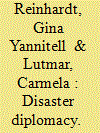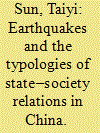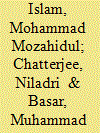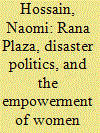|
|
|
Sort Order |
|
|
|
Items / Page
|
|
|
|
|
|
|
| Srl | Item |
| 1 |
ID:
184187


|
|
|
|
|
| Summary/Abstract |
The COVID-19 pandemic has drawn worldwide attention to the difficulties inherent in managing disasters. Scholars across disciplines have been forced to consider the impact disasters have on interstate relations, state resilience, patterns of violence and hostility, and the vulnerabilities that condition conflict. This special issue offers new insights to help disentangle the relationship between disasters, conflict, and cooperation, by adhering to a three-pronged theoretical framework. First, all pieces in this issue are underpinned by a unified understanding of disasters as endogenous social phenomena. Second, we acknowledge that disasters occur as processes rather than discrete events. Finally, we explore the possibility that disasters and conflict are co-determined by a common set of factors. The articles herein were chosen not only because they advance academic thought about the disaster–conflict nexus, but also because of their potential to advance the practical impact of this line of research on the global conflict and disaster landscape. We highlight the relevance of this special issue for further work investigating the effects of conflict on disasters and the relationship between the hazards cycle process and patterns of violence and hostility, as well as the implications of adopting this suggested framework for policymaking and data collection.
|
|
|
|
|
|
|
|
|
|
|
|
|
|
|
|
| 2 |
ID:
156520


|
|
|
|
|
| Summary/Abstract |
The proliferation of civil society organizations after the 2008 Wenchuan earthquake and the 2013 Lushan earthquake in China has caught the attention of scholars in Chinese politics and disaster politics. Immediately after the earthquakes and during the recovery period, civil society organizations were given a rare opportunity to work closely and intensely with the state. As a result, these organizations adjusted their behaviour – sometimes compromising with the state on many fronts – in exchange for better relations with the state and in order to achieve their goals, but they had to work in new and creative ways. Drawing on evidence from a dozen case studies and 61 in-depth interviews with government officials and leaders of civil society organizations in Sichuan Province, this article argues that we can map the state’s preferences and policy distinctions through its varied responses to these organizations during an earthquake recovery period. Specifically, whether the state is more effective in delivering public goods and services in a given area and whether the goals of civil society organizations align with those of state are two key determinants of relations between the state and civil society organizations. This article proposes a comprehensive typology of such relations in China: complementary, cooperative, competitive and confrontational. These categories are not static, because the government and civil society organizations adjust their policies and behaviour as they interact. These learning experiences, triggered by the earthquakes, create a dynamic process of evolving state–society relations in China today.
|
|
|
|
|
|
|
|
|
|
|
|
|
|
|
|
| 3 |
ID:
190942


|
|
|
|
|
| Summary/Abstract |
The article explores the impact of one of the deadliest disasters in the twentieth century, the East Pakistan cyclone of 1970, also known as the Great Bhola Cyclone, on the first-ever general election held in united Pakistan immediately thereafter. It argues that the cumulative dissidence of the eastern bloc since the partition of India in 1947 had reached its crescendo and made a landfall impact following the disastrous aftermath of the cyclone, which was evidenced in the general election of December 1970, creating the very triggering effect that led to a series of political events and the bloodbath that followed, eventually culminating in the formation of an independent nation-state of Bangladesh in 1971. While doing so, the article builds on the literature on disaster and electoral politics, historical disasters, and uses hitherto underexplored sources, both official and unofficial, archives, and personal memoirs.
|
|
|
|
|
|
|
|
|
|
|
|
|
|
|
|
| 4 |
ID:
170270


|
|
|
|
|
| Summary/Abstract |
Bangladesh’s garments workers have served as both an emblem of that country’s rapid social and economic progress, and of the precarities of labour in global value chains. Based on an understanding of how disaster politics have played out in Bangladesh’s history, this article explores whether and how the Rana Plaza disaster has been a critical juncture in the politics of the sector, resulting in a shift in power relations that empowers workers to demand and secure their rights. Drawing on a framework developed by Mark Pelling and Kathleen Dill for the analysis of the politics of natural disasters, the article explores the aftermath of the 2013 factory collapse in which 1,134 factory workers were killed. The article examines changes in workers’ own agency and resources, and in their relationships to the state and transnational actors. The article concludes that while the disaster was a turning point in key respects, it has not – unlike previous major disasters in Bangladesh – generated an elite consensus over the priority of workers’ rights and in particular of trade unions. Workers are more empowered than in the past but have yet to fully reverse their historical associational and structural disempowerment.
|
|
|
|
|
|
|
|
|
|
|
|
|
|
|
|
|
|
|
|
|